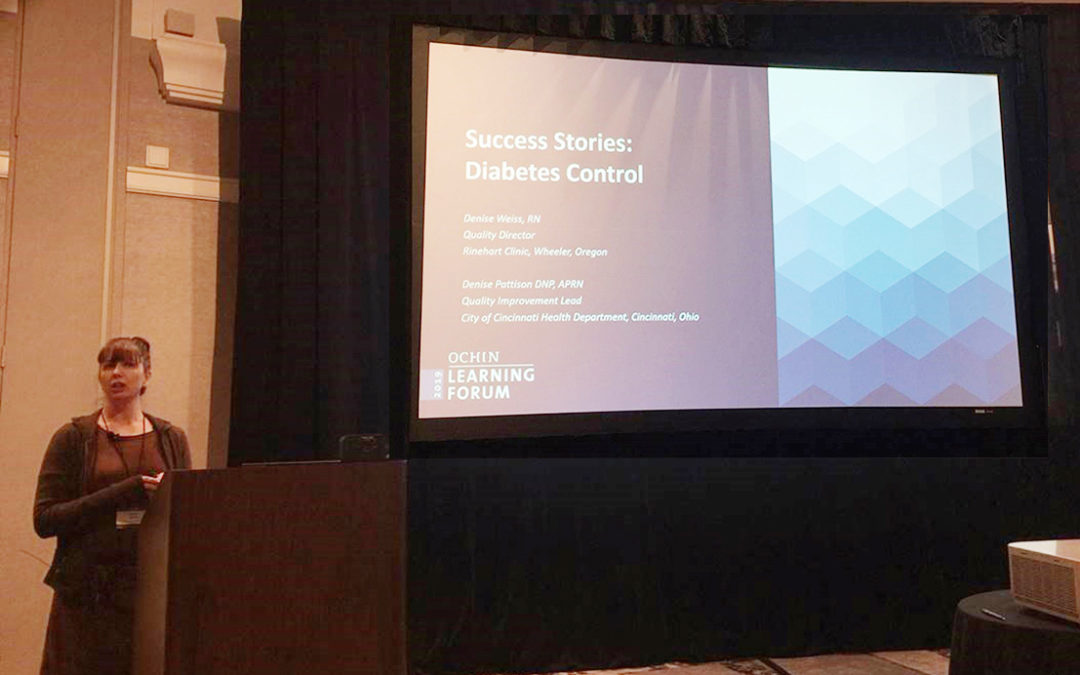Rinehart Clinic’s Quality Director, Denise Weiss, presented the clinic’s “Success Stories: Diabetes Control” at a recent OCHIN Learning Forum attended by healthcare centers from across the region. (OCHIN is an electronic health record program.)
Tillamook County Wellness partners are teaming up to help people more readily access the things they need to make healthy behavior changes, because cost and convenience are often the leading barriers to developing better habits. Wellness committees are working to improve community walkability and outdoor recreation access; exploring innovative ways to ensure people have access to healthy foods like fresh produce, no matter where they live. There are community surveys and interviews being conducted about how we are screening for chronic diseases, and how to better connect patients with a network of care to lower that risk.
The Rinehart Clinic in Wheeler has been providing this level of support to their patients with much success. They recently shared their story at a regional forum so other communities can learn from their example.
Rinehart Clinic’s Diabetes Success Stories featured at Learning Forum
Rinehart Clinic’s Quality Director, Denise Weiss, recently presented “Success Stories: Diabetes Control” at a Learning Forum in Portland, sharing the clinic’s strategies for helping patients with type 2 diabetes manage the disease.
According to Denise, “One of the key factors of our patients’ success is their participation in the clinic’s healthy eating and lifestyle classes in between regular visits with their doctor. To make it easy as possible for our patients to make positive changes in their health, we offer encouragement in the form of farm-fresh veggies, vouchers for healthy foods at a local grocery store or farmers market, and free physical activity passes to help them on their journey.”
The behind-the-scenes work by Rinehart Clinic’s Panel Coordinator is also a critical part of the program. The Panel Coordinator tracks how our patients are doing, patient-by-patient and diagnosis-by-diagnosis. When it’s time for a check-up or screening to see how the patient is doing, she notes that in the chart so the care team can coordinate with the patient. Having a staff member dedicated to coordinating this tracking and working with the team on follow-up is an important part of what’s working well at Rinehart Clinic. Last year, Rinehart Clinic was recognized for being the top performing clinic for diabetes control within the Columbia Pacific Coordinated Care Organization member clinics.
Many of the lifestyle habits that reduce risk for type 2 diabetes can also help people better manage the condition. Making and sticking with healthy behavior change is difficult for most people, especially without any follow-up or encouragement. When advising a patient how to lose weight, improve blood sugar levels, or lower their blood pressure, health care providers often recommend adopting healthier eating patterns and becoming more physically active. Research has shown these types of changes can significantly improve health and prevent chronic diseases, such as type 2 diabetes, heart disease and many forms of cancer.
Changing how we eat and move requires developing new habits and routines which can be overwhelming, expensive or simply inconvenient. Having a support team such as the one at Rinehart Clinic can help, but there is a lot more to the process. Healthy food options need to be available and affordable. If someone lives a long way from a store, they need reliable transportation. Similarly, living in an apartment on a busy street does not allow for a convenient or safe space to exercise and having access to a gym costs money.
Tillamook County Wellness partners are working to remove these barriers and provide support programs to reduce the risk for Type 2 diabetes. To find out more about the Rinehart Clinic diabetes program, the Diabetes Prevention Program available through the YMCA or other resources, go to www.tillamookcountyhealthmatters.org or like the Tillamook County Wellness Facebook page.

